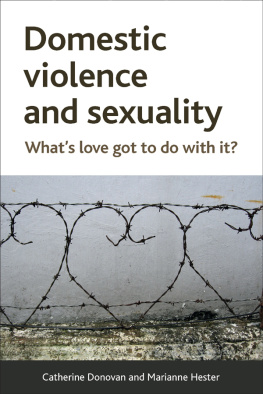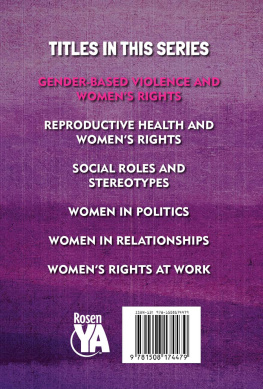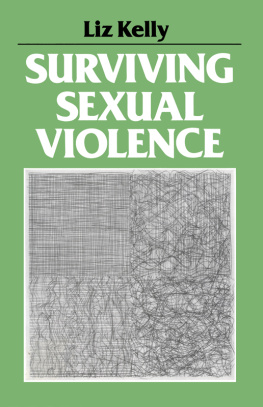University of California Press
Oakland, California
2021 by Paige Sweet
Library of Congress Cataloging-in-Publication Data
Names: author. Sweet, Paige L., author
Title: The politics of surviving : how women navigate domestic violence and its aftermath / Paige L. Sweet.
Description: Oakland, California : University of California Press, [2021] | Includes bibliographical references and index.
Identifiers: LCCN 2021015702 (print) | LCCN 2021015703 (ebook) | ISBN 9780520377707 (hardcover) | ISBN 9780520377714 (paperback) | ISBN 9780520976429 (ebook)
Subjects: LCSH: Victims of family violenceServices forUnited States. | Abused womenUnited StatesSocial conditions. | Abused womenUnited StatesPsychological aspects.
Classification: LCC HV6626.2 .S95 2021 (print) | LCC HV6626.2 (ebook) | DDC 362.82/920973dc23
LC record available at https://lccn.loc.gov/2021015702
LC ebook record available at https://lccn.loc.gov/2021015703
Manufactured in the United States of America
25 24 23 22 21
10 9 8 7 6 5 4 3 2 1
Acknowledgments
Ive relied on the generosity of so many to write this book. My deepest gratitude goes to the domestic violence survivors and anti-violence advocates who tolerated my intrusions into their homes and workplaces, who told me their stories with such candor and wit. Thank you.
I developed these ideas under the guidance of faculty and graduate students in the sociology department at the University of Illinois at Chicago, a program that nurtured my political commitments as deeply as my sociological ones. Claire Decoteau has been a true mentor and ally the whole way through. Im sure I never would have made it without her, and I hope to be as committed and generous to students as she has been to me. To have a mentor I admire so much as a scholar and as a person is a real gift, and Im so grateful.
Beth Richie has been a thoughtful advisor on this project and on my careerher scholarship, her warmth, and her passion never fail to amaze me. Many thanks also to Lorena Garcia, Sydney Halpern, and Annemarie Jutel, who served on my dissertation committee and provided invaluable feedback. At UIC, I also benefited from the mentorship of Barbara Risman, Nadine Naber, Laurie Schaffner, Andy Clarno, Maria Krysan, and Barbara Ransby. Im incredibly grateful to all the graduate students at UIC who helped and inspired me along the way. To my good friends Jody Ahlm, Michael De Anda Muiz, Tnde Cserpes, and Meghan Daniel, thank you, thank you, I wouldnt be here without you. My work and spirits have been boosted at critical times by Kate McCabe, Erin Eife, Eric Knee, Emily Ruehs-Navarro, Anna Colaner, Lain Mathers, Sarah Steele, Sangi Ravichandran, and Piere Washington.
Ive been lucky to be a part of several reading and writing groups that have made me love this job. Claire Decoteaus reading group at UIC was an indispensable part of my education. To Kelly Underman and Danielle Giffort, I owe so much. Such good friends, such excellent sociologiststo get their feedback on my work and their support on whatever is a privilege. To Heather Welborn, thank you for making me smarter and happier in graduate school. To my dear friend Katelin Albert, thank you for your intelligence, for being there, for making me laugh. Im so grateful to Maryam Alemzadeh, Anna Skarpelis, Hanisah Sani, Moira OShea, and Sneha Annavarapu for giving me a lovely virtual community while writing this book.
My thanks to the family of Susan Schechter for allowing me access to her archives, as well as to the archivists at Smith College, Harvards Schlesinger Library, and DePaul University. Im so grateful to the National Coalition Against Domestic Violence for allowing me to scour their storage units in search of historical materials. Key insights were also offered by the staff at the National Center for Domestic Violence, Trauma, and Mental Health, especially Heather Phillips and the incomparable Dr. Carole Warshaw. Thank you to the generous people at Mujeres Latinas en Accin and Sarahs Inn for guidance on this research. I thank Valeria Velazquez, Jasmine Maldonado, and Hector Dominguez for their excellent assistantship during fieldwork. The National Science Foundation, ACLS/Mellon Foundation, the Rue Bucher Memorial Award at UIC, the Alice J. Dan Dissertation Award, and the Chancellors Award at UIC all provided valuable funding for this project.
I was lucky enough to find myself at the Inequality in America Initiative at Harvard University for two years while working on this book. To Claudine Gay, Larry Bobo, and Jennifer Shephard, thank you for not only leading a program that gave me time and space, but for offering real encouragement and guidance. Jocelyn Viterna has made me a better scholar and has taught me what it means to carry oneself with grace and care in this profession. I certainly wouldnt be where I am today without Jocelyns encouragement and careful reading of my work. I owe thanks to Jocelyns graduate students, who welcomed me into their community and contributed important feedback to this project. My gratitude to Caroline Light for taking me under her wing, and to the sociology faculty at Harvard for creating a welcoming space in the department. Julia Weiner, a brilliant student and an anti-violence advocate herself, provided excellent research assistance on this project. A warm thank-you to the fellow postdocs who made my time in Cambridge so special, especially Anthony Johnson: I couldnt have done it without your kindness and camaraderie. Anna Skarpelis provided ongoing encouragement and feedback, as did Michael Aguirre, Miao Qian, David Mickey-Pabello, Charlotte Lloyd, Talia Shiff, and Shai Dromi. To the Cambridge Womens Center, where I spent afternoons answering hotline calls and talking with members while writing this book, thank you for reminding me that it is possible to provide care and community to those who need it, without demanding anything in return.
While at Harvard, I had the incredible experience of convening a book manuscript workshop with some of the scholars I admire most. Enormous thanks to Lynne Haney, Cecilia Menjvar, and Catherine Connell. This book is only what it is because they took the time to read and comment. The first time I read Lynnes work, I knew I had found a place in sociology, and I thank her for supporting me. Cecilias scholarship is a constant guidepost for me, and she isunsurprisinglyalso a very generous advisor. Cati Connells support has meant so much, and I hope to be the kind of mentor and scholar she is. A huge thank-you, as well, to Naomi Schneider and Summer Farah at UC Press. Gratitude to Michelle Pais for emergency design advice and to Donna Ferrato for allowing me to use her remarkable photograph on the cover.
Since coming to the University of Michigan, Ive had the warm support of Karin Martin, Elizabeth Wingrove, and especially Elizabeth Armstrong and Anna Kirkland, who both took the time to support me long before I landed at U-M. My department has been so welcoming, despite the strange and isolating period during which I started this job. My love to Robert Manduca, Roseanna Sommers, Luciana de Souza Leo, Neil Gong, Kate McCabe, and Apryl Williamsthank you for helping to make Ann Arbor home.







